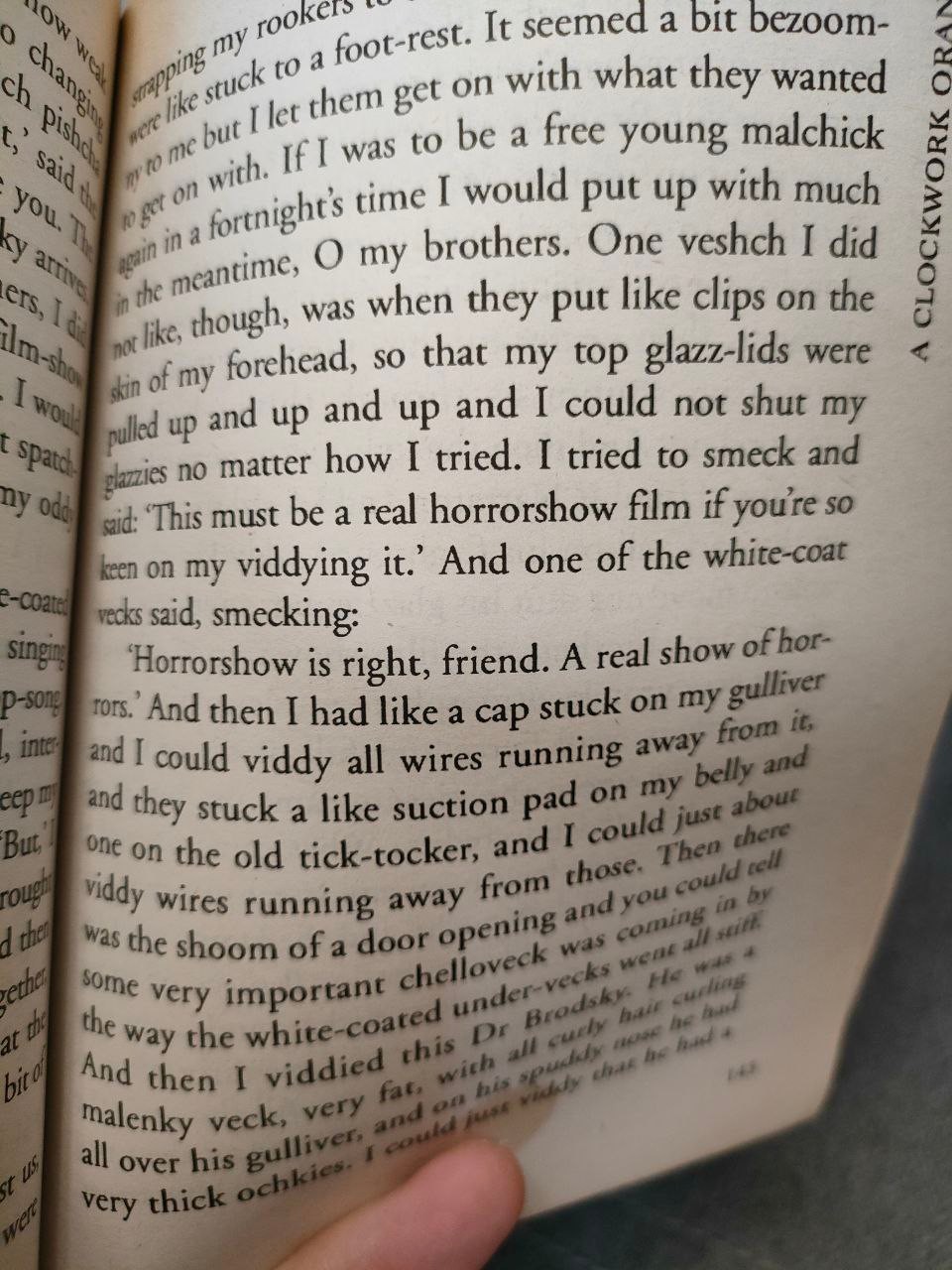
In June, my book club read A Clockwork Orange (1962) by Anthony Burgess. It's a dystopian book that depicts a society in which there's a certain groups of teenage boys that's extremely violent. The book is written from the point of view of a 15-year-old Alex, who has three friends, with whom he assaults, robs and rapes people.
The interesting thing about this book from a linguistic viewpoint is that these young people use a slang called Nadsat, which the author made up for the book. It uses a bunch of Russian words, for example vidying instead of seeing (from Russian videt (видеть)), or bolshy for big (from bolshoy (большой)). But those are easy examples — there are no such words in English, and their Russian counterparts are obvious. The harder ones for me were those written similarly to English words, like Bog (Бог — God) — I thought, they were praying to a swamp or something! Or horrorshow, which I took literally, considering how violent the book is. It took me 80 pages to realize they meant horosho, which means good (хорошо).
Apparently, the author purposefully wanted to make it hard for the reader to understand the teenagers in the book. He thought that any real slang would get old pretty fast, and he wanted to set the novel sometime in the imaginary future, so he came up with his own. What can I say? Mission accomplished! It was really hard to go through those pages. Even knowing Russian didn't give me much of an advantage. I honestly thought that Anthony Burgess used a dictionary without understanding how those Russian words work, so I was surprised to learn that he actually knew Russian and even visited Soviet Russia. At a certain point I gave up and looked up the dictionary for this so-called Nadsat. And it has like more than a hundred words!
Reading a book with made-up slang is certainly not something new to me. For example, 1984 by George Orwell has Newspeak. But I think it made sense in the story. And it wasn't overused like Nadsat was in A Clockwork Orange. Was it really necessary to replace common words like seeing, going, saying with their made-up counterparts? I don't think so. And it was really distracting. The only payoff for me was the following wordplay around the word good:
— This must be a real horrorshow (good) film if you're so keen on my viddying (seeing) it.
— Horrorshow is right, friend. A real show of horrors.
Aside from that, if the only idea was to create a sense of alienation, I don't think it was worth it.
However, Nadsat aside, what do I say about the book itself? I quite liked it; the world it depicted was interesting, and the story was engaging. I didn't really like the ending, though. I also don't think it offered anything thought-provoking except for the topic of free will — the main character, Alex, gets reprogrammed by some form of hypnosis that renders him incapable of doing evil, so he's forced to only do good. A prison chaplain made the following comments:
Goodness is something to be chosen. When a man cannot choose he ceases to be a man.
Choice! The boy has not a real choice, has he? Self-interest, the fear of physical pain drove him to that grotesque act of self-abasement. The insincerity was clear to be seen. He ceases to be a wrongdoer. He ceases also to be a creature capable of moral choice.
There's also a movie version of this book made by Stanley Kubrick, which actually made the book popular. It was considered so violent at the time that it was even withdrawn from British movie theaters and banned in several countries. However, in this day and age, we're so desensitized to depictions of violence that I doubt you'll be that shocked.
Thanks for sharing.
Very interesting to read! Thank you for sharing!! I'd love to read it too.
I only saw part of the movie when I was in my thirties. Funny enough, I didn't know a lick of Russian at the time, and I remember having to turn on the subtitles because I couldn't make out anything they said. I had no idea it was a Russian-based slang at the time — I just thought it was the Brits up to their old tricks! 😅 Great review! Now I don't have to read the book either 😵💫
I didn't find the slang in Clockwork Orange hard to understand but I suppose if English is your second language it might be confusing which words are English and which are 'slang'. Knowing Russian would have been helpful to help it make more sense though. Having a distinctive slang for a subgroup or subculture in a show / book can be a good way of showing who is a member of the 'tribe'. I remember a Star Trek: Voyager episode where one of the crew was being tricked into joining one side of a war. The group trying to get him to join had their own slang and the more he was sucked in the more he started to adopt the way they spoke. :)